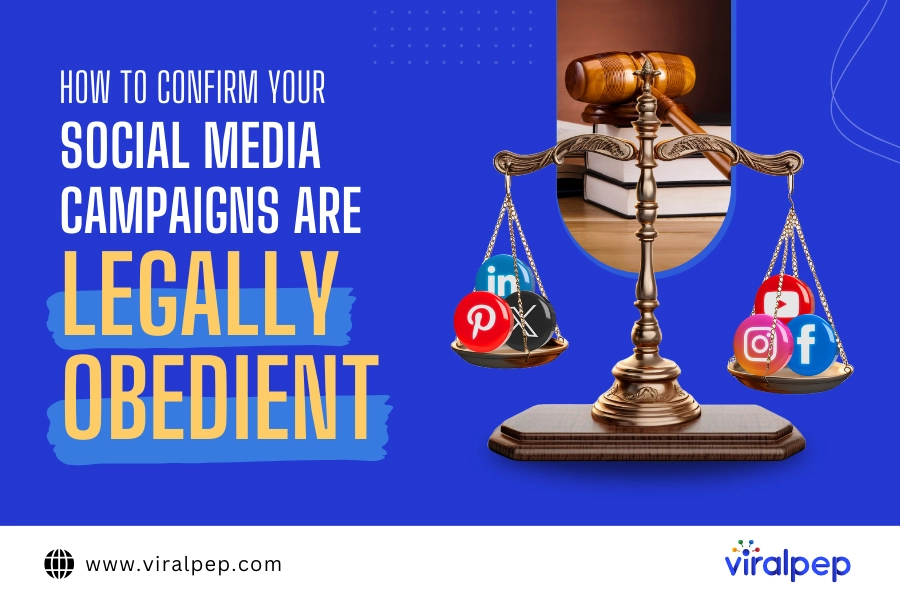Social media is an essential tool for marketing, but navigating the legal landscape can be challenging. To avoid legal actions, reputational damage, and penalties, it’s crucial to ensure your social media strategies comply with all relevant laws and regulations.
Legal Obligations
Every social media campaign must adhere to specific laws. Understanding these regulations is the first step to protecting your campaign.
-
Laws and Regulations
The key regulations governing social media marketing include the GDPR, CCPA, and FTC Guidelines. The GDPR protects user privacy in Europe, the CCPA protects consumer data in California, and the FTC Guidelines require truthful advertising. Complying with these laws helps you align your campaigns with legal standards and minimize the risk of legal issues.
-
Industry-Specific Regulations
Certain industries, such as finance and healthcare, have their own specific regulations. For instance, HIPAA protects patient privacy and governs healthcare marketing. Adhering to industry-specific regulations not only meets legal requirements but also enhances customer confidence in your business.
Protecting Consumer Privacy
One of the main concerns with social media campaigns is consumer privacy. Mishandling data can attract regulatory scrutiny and damage consumer trust.
-
Data Collection Practices
Collect consumer data transparently. Legally, you must disclose what data is being collected and how it will be used. Transparent practices build trust with your audience and improve brand credibility.
-
Data Storage and Security
Storing consumer data securely is vital for compliance. Use robust data protection measures and encryption to safeguard information. Strong security protocols minimize the risk of data breaches and potential fines.
-
Consumer Consent
Obtaining explicit consent from users before data collection is mandatory. Ensure that your opt-in forms and privacy policies are clear and straightforward. Transparency in consent procedures demonstrates your commitment to user privacy.
Transparent Advertising Practices
Honesty and transparency in advertising not only comply with regulations but also enhance your brand’s credibility. Misleading advertisements can result in severe penalties and loss of consumer trust.
-
Ensuring Accuracy in Advertising
Truthful representation of your products and services is essential. Avoid making false claims or exaggerating benefits. Accurate advertising builds long-term trust with your audience and keeps regulatory bodies at bay.
-
Influencer Partnerships
Legal requirements dictate clear terms in influencer partnerships, including the disclosure of sponsorship and clear contracts. Well-defined agreements prevent misunderstandings and protect against legal repercussions.
-
Viralpep’s Commitment to Transparent Advertising Practices
At Viralpep, we prioritize honesty and transparency in advertising. By adhering to regulations, disclosing sponsored content clearly, ensuring accuracy in representations, and establishing transparent terms in influencer partnerships, Viralpep upholds its brand credibility and fosters trust with consumers and regulatory authorities alike.
Intellectual Property Rights
Understanding intellectual property rights is crucial in social media campaigns to avoid unintentional infringement and protect your content.
-
Using Copyrighted Material
Using copyrighted images, videos, and music requires permission from the rights holders. Ignoring copyright laws can lead to costly legal action. Always seek the necessary permissions to prevent any legal complications.
-
Protecting Your Content
Safeguard your original content by securing copyrights and trademarks. Ensure that your intellectual property is legally protected against unauthorized use, preserving your brand’s value and uniqueness.
-
User-Generated Content
Sharing user-generated content has legal implications. Obtain rights and give proper credit to the creators. Respect for intellectual property rights builds a positive rapport with your audience and avoids legal hurdles.
Complying with Platform-Specific Policies
Each social media platform has its own set of policies. Understanding and adhering to these guidelines ensures your campaigns run smoothly within the platform’s rules.
-
Understanding Terms of Service
Familiarize yourself with the terms of service for platforms like Facebook, Instagram, and Twitter. These agreements govern how you can use the platform. Awareness of these terms ensures your campaigns comply with platform-specific rules.
-
Content Moderation and Community Guidelines
Ensure your content aligns with platform community guidelines. Prohibited content types vary across platforms, so tailor your content accordingly. Adhering to community guidelines helps maintain a positive brand image and avoids account suspension.
-
Ad Policies
Each platform has unique ad approval processes and guidelines. Understand these policies to ensure your ads are compliant and promptly approved. Compliance with ad policies accelerates campaign deployment and enhances effectiveness.
Monitoring and Enforcement
Regular monitoring and enforcement of compliance measures are necessary. This ongoing process helps promptly identify and rectify any issues.
-
Regular Audits and Reviews
Conduct regular compliance audits of your social media campaigns. Audits identify any gaps in compliance and areas for improvement. Consistent reviews ensure your campaigns remain legally sound.
-
Training and Education
Keep your marketing team educated on the latest legal requirements. Regular training sessions ensure everyone is updated on best practices. Knowledgeable teams effectively implement compliance measures, ensuring legal consistency.
-
Legal Counsel
Seek professional legal advice whenever necessary. Legal experts provide guidance tailored to your specific needs. Professional counsel ensures thorough legal scrutiny and compliance.
Handling Legal Issues
Even with the best protections, legal issues can arise. Knowing how to handle them effectively can mitigate damage and resolve the issues swiftly.
-
Responding to Complaints
Address complaints about misleading advertisements or privacy violations promptly. Swift and transparent handling shows your commitment to ethical practices. Effective complaint management mitigates potential legal fallout.
-
Managing Legal Disputes
Follow established steps in the event of legal action against your campaign. Engage competent legal expertise to navigate disputes. Effective dispute management minimizes potential damages and upholds your brand’s reputation.
-
Accessing Legal Documents
Creating comprehensive legal documents can be crucial when facing legal challenges. Legal sites like Lawrina offer a variety of essential legal documents that can assist you in understanding your legal position and preparing your defense. Access to well-structured documents ensures you are better equipped to handle any legal issues.
Conclusion
Ensuring your social media campaigns are legally compliant is paramount. By following these guidelines, you can navigate the regulatory landscape effectively. Always be proactive in maintaining compliance and seek professional legal advice when needed. At Viralpep, we are dedicated to supporting you in creating compliant, effective social media campaigns, with our features like scheduling and analytics. To witness it first-hand, sign up for your free trial today.












